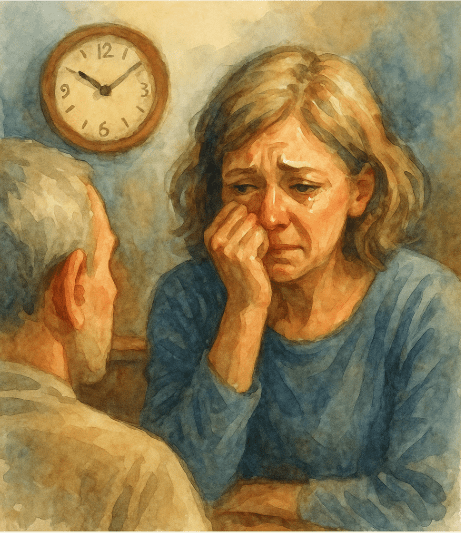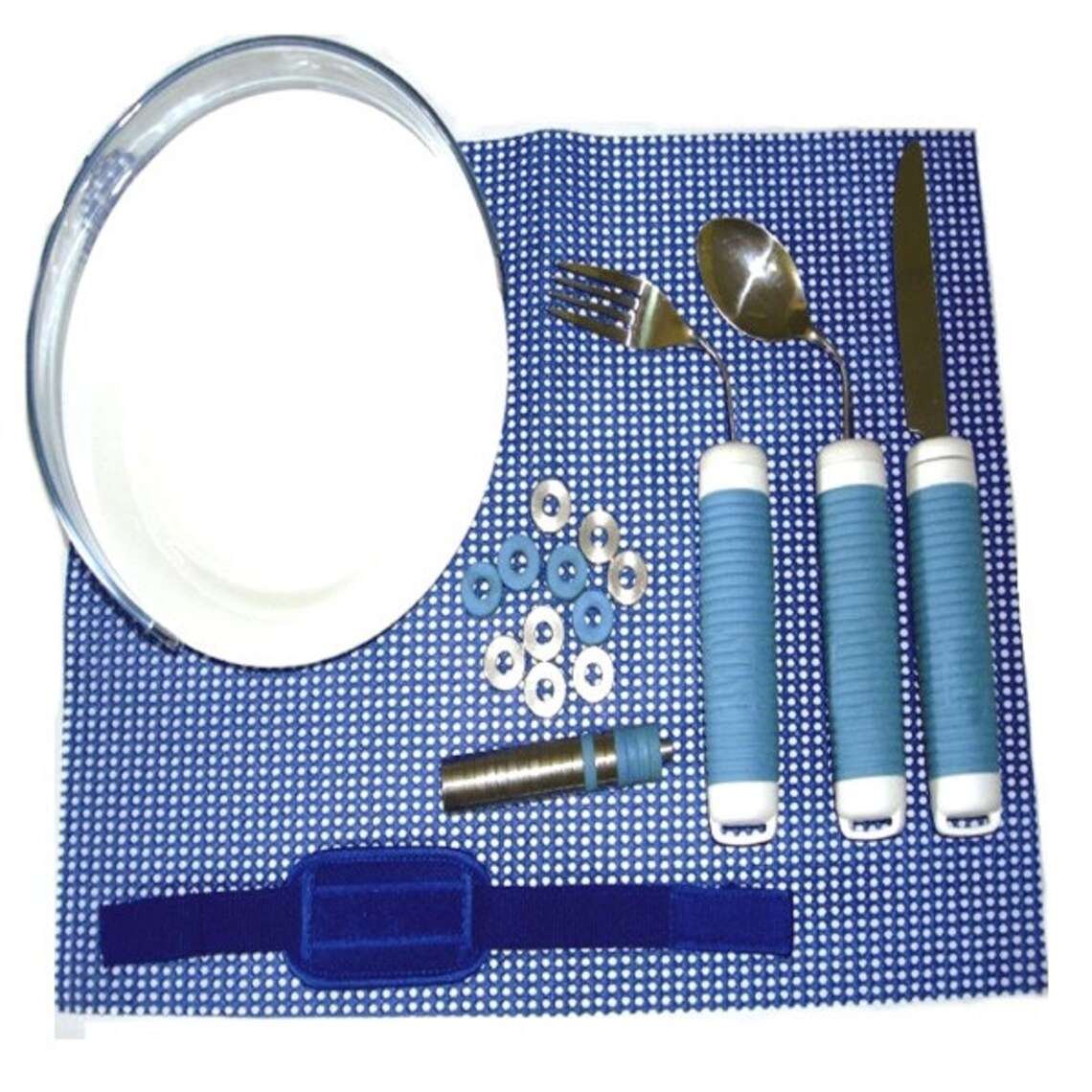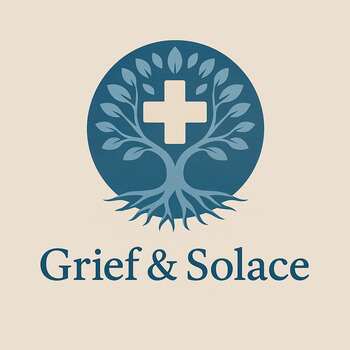Grieving Huntington’s Disease: Watching the Mind and Body Slip Away
Grief with Huntington’s is merciless. watching someone you love lose control of movement, memory, and meaning, one cruel inch at a time.

This post blends real grief with grounded knowledge. It isn’t clinical. It isn’t distant. It’s meant to sit beside you—not above you. The story you’ll read is meant to reflect what so many feel when living through or witnessing this condition: confusion, exhaustion, and quiet forms of courage.
If what you read feels familiar, please speak with your doctor. Your pain deserves more than silence.
She Fought to Stay Herself Until Even That Was Taken
She used to dance in the kitchen…
Not ballet, Not choreographed, Just wild, unfiltered motion. Pots on the stove, music playing low, socks sliding on the tile. She’d twirl with a spoon like the world was soft, like her body would always be her ally.
And then the twitching started…
At first, it was a shrug she didn’t mean to make. A dropped cup. A stumble blamed on clumsy feet. But I saw the shift in her eyes. She knew. Before the neurologist, before the test, before the words “Huntington’s Disease” sat heavy in our mouths like something rotten and irreversible.
Her mother had it. We always knew it was a possibility, 50/50, like fate was flipping a coin behind her back every time she laughed.
Risk Factors:
Having a parent with Huntington’s disease
Family history of Huntington’s
🧠 Symptoms:
movement:
Involuntary jerking or writhing (chorea)
Muscle rigidity or contractures
Slow, unusual eye movements
Difficulty walking, balance problems
Trouble speaking or swallowing
Inability to control voluntary movements
cognitive:
Difficulty organizing, prioritizing, or focusing
Perseveration (getting stuck on thoughts or actions)
Poor impulse control and judgment
Lack of self-awareness
Slow thought processing and trouble finding words
Difficulty learning new information
mental_health:
Depression (not purely reactive; neurochemical)
Irritability, sadness, or apathy
Social withdrawal
Sleep disturbances
Fatigue, suicidal ideation
OCD, mania, or bipolar disorder
juvenile_onset:
Behavioral changes, poor school performance
Muscle stiffness and tremors
Clumsiness or frequent falls
Seizures
I think she hoped the odds would skip her… That her love of movement, her stubborn will, and her laughter would somehow rewrite her DNA.
But Huntington’s doesn’t care how brightly you lived. It dims you anyway.
It wasn’t just the movement. It was the mind. The slipping of memory. The change in her tone. The way her sentences frayed at the ends like even language had started packing its bags.
And the rage…not at me. At it. At the slow invasion of self. She once screamed for an hour because she couldn’t remember how to open a toothpaste cap. I found her on the floor, sobbing as if her bones had given out. But it wasn’t a weakness. It was grief in motion.
I became her everything: caretaker, translator, nurse, punching bag, memory holder.
And still…still…she tried. Tried to say “thank you.” Tried to sing even when the words were slurred. Tried to smile when our son walked into the room, even when her muscles forgot how.
Complications:
Progressive loss of independence
Inability to walk, speak, or swallow
Increased risk of suicide, especially pre-diagnosis or during loss of independence
Death often due to infections, injuries, or choking
Juvenile-onset leads to death typically within 10–15 years
Causes:
Genetic mutation in the HTT gene (autosomal dominant)
Only one copy of the altered gene is needed to develop the disease
50% chance of inheritance if one parent carries the gene
People think it’s the body that goes first. But it’s not. It’s the edges of self. The little things, the rhythm in speech. The way she once tilted her head when she was thinking. The part of her that used to hum while folding laundry. Gone, like smoke in the wind.
And yet, when her words were gone when her limbs flailed and her spine curved like a question she couldn’t answer, she still looked at me with recognition.
Maybe not by name, Maybe not with speech, But in the eyes. In the way she looked at me. There was love. Still.
She fought to stay herself. Fought like hell. But Huntington’s is a thief that takes its time.
And one day, even that was taken too.
“Memory doesn’t die all at once. It drips. It slips. Until only love is left—and even that forgets its name.”.
📘 Diagnosis & Treatment
diagnosis:
Neurological examination for motor, sensory, and psychiatric symptoms
Cognitive testing (memory, language, reasoning)
Psychiatric evaluation (mood, thought quality, coping)
Brain imaging (MRI or CT) for changes and exclusion of other causes
Genetic testing to confirm HTT gene mutation
Predictive testing available for at-risk individuals, often with counseling
treatment:
movement_disorders:
Tetrabenazine, deutetrabenazine, valbenazine to control chorea
Antipsychotics for movement suppression, though may worsen dystonia
Other meds: amantadine, levetiracetam, clonazepam
mental_health:
Antidepressants: citalopram, fluoxetine, sertraline
Antipsychotics: quetiapine, olanzapine
Mood stabilizers: divalproex, carbamazepine, lamotrigine
supportive_therapies:
Psychotherapy for coping and behavior management
Speech therapy for communication and swallowing
Physical therapy for mobility, balance, fall prevention
Occupational therapy for adaptive strategies and tools
lifestyle:
High-calorie diet to combat weight loss
Utensils and tools for motor skill assistance
Home modifications (rails, bathroom aids)
Scheduled routines, calm environments, and visual cues to manage cognition
Educational support for children and teens
Socialization opportunities and emotional support
long_term_planning:
Legal preparations: living wills, advance directives
End-of-life planning: care facilities, hospice support
Discussions involving family and care teams to honor patient wishes
I know this is heavy, and I understand that the road ahead may feel like a tangle of loss and unanswered questions. But please hear this: you are not broken because you are hurting; you are not weak because you are afraid. You are living through something real, and survival itself is a kind of grace. You are allowed to struggle, you are allowed to hope, and you are allowed to not have all the answers today. Whatever comes next, you do not face it empty-handed; you carry every moment of love that shaped you, and that will always be enough to keep going.
🎀 Gifts to help With Huntington's Disease
🏥 Everyday Comforts for Everyday Battles
Managing Huntington’s Disease often means needing a little extra help.
Sometimes it’s about restoring dignity, ease, or simply getting through the day with less pain.
These carefully chosen tools aren’t just items; they’re small bridges back to living.
This section is about finding practical support, never shame.
Adaptive Weighted Utensil Set – Dignity at the Table When the Hands Betray
Huntington’s makes eating difficult—grip weakens, arms flail, coordination disappears. These weighted utensils help reduce tremors and bring a sense of control back to one of life’s simplest rituals. Dishwasher-safe, built for daily use, and shaped for dignity—not pity. Because even when everything else slips, mealtime matters.
🌿 Paths to Healing Beyond the Map
Sometimes traditional medicine isn’t enough.
If you’re exploring gentle, alternative options to help with Huntington’s Disease,
you might find comfort in plant-based compounds like **CBD or CBG**.
*This section is not medical advice, just a door left open.*
USA Medical Total Support Pack – Gentle Support When the Brain Won’t Hold Still
As Huntington’s progresses, the nervous system burns out—taking mood, memory, and muscle with it. This Total Pack offers CBD, stress relief, and calming aid to help ease anxiety, support sleep, and reduce agitation during early to mid stages. It won’t slow the disease. But it may make the quiet moments gentler—for the person and their caregivers.
Need a Different Path Forward?
Every journey through grief looks different. Choose the next step that speaks to where you are now:
When You're Ready to Start Healing
Healing doesn’t mean forgetting.
It means finding small ways to carry your grief with strength and grace.
These are the stories, tools, and gentle steps to begin walking forward…at your own pace.
When You're Still in the Thick of It
Sometimes healing feels like a lie.
If you’re not ready to move on…if the pain still roars louder than the world wants to hear…this is the place where you’re allowed to feel it.
No sugarcoating. No pretending. Just truth.
When You're Holding on to Who’s Still Here
Grief reminds us to love louder.
If someone you love is still with you, this is your place to celebrate them, honor them, and create new memories while there’s still time.
Joy and sorrow can live side by side.






